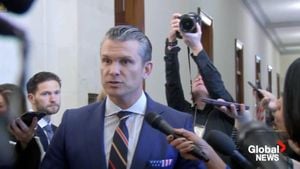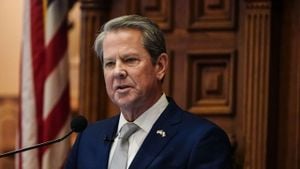Canadian politics often witnesses its fair share of shifts and appointments, and the recent moves within the British Columbia Conservative Party are no exception. Following the announcement of BC Premier David Eby’s cabinet, the Conservative Party of BC under John Rustad took the limelight by introducing their shadow cabinet, marking significant appointments aimed at addressing key issues within the province.
On November 19, Aaliya Warbus, the MLA for Chilliwack-Cultus Lake, was named as the House Leader of the Conservative Party's shadow cabinet. Rustad hailed this as not just another appointment but as one with historic significance, highlighting Warbus's role as central to the party's strategy moving forward. "Our shadow cabinet is a diverse and experienced group, committed to restoring prosperity, public safety, and affordability for every British Columbian," Rustad noted, aiming to portray the party as responsive to the pressing needs of the public.
Warbus isn't the only notable face within the reshuffled cabinet. Heather Maahs, the MLA for Chilliwack North, has taken on the responsibility of Children and Family Development, including Indigenous Self-Government within Child and Family Services. This suggests the Conservatives are taking a comprehensive approach to incorporate Indigenous issues within social policy, reflecting growing recognition of the importance of these matters.
Rustad's cabinet line-up is shaped by experience and expertise. Among the key leadership roles, Bruce Banman has taken on the whip position, with Sheldon Claire serving as deputy whip. This solidifies Rustad’s team as one emphasizing organization and discipline within their ranks as they prepare to challenge the current government.
The cabinet also boasts individuals with specialized portfolios, each tasked with overseeing specific areas of public policy. For example, Ian Paton has been appointed to Agriculture, Fisheries, and Agricultural Land Commission. Meanwhile, Tony Luck oversees Municipal Affairs and Local Government, and contributing to the extensive provisions of health and welfare are individuals like Anna Kindy for Health and Claire Rattee for Mental Health and Addictions.
Prominent among the appointments are also leaders addressing economic concerns. Peter Milobar is managing Finance, with the intent to steer financial policies aimed at economic recovery and sustainability. Gavin Dew’s role focuses on Jobs, Economic Development, and Innovation, underscoring the Conservative framework on economic dynamism and job creation.
Just as notable is the emphasis on environmental and resource management, with donegal Wilson responsible for Water, Land, Resource Stewardship and Wildlife Management. This reflects the party’s awareness of the conflict and collaboration required between environmental sustainability and economic development, particularly relevant to British Columbia’s diverse ecosystems and habitats.
Not to overlook educational issues, Korky Neufeld has taken the reins for Post-Secondary Education and Skills Training, with packets covering training for international credentials among his responsibilities. This highlights the party’s intent on cultivating educational pathways and appropriate skill development to meet market demands.
Rustad's release on the matter evidently radiates optimism about this newly formed cabinet, hinting at the coalition’s organizational zest and readiness to deliver real solutions to the challenges faced by the province. His assertion reflects not only confidence but also the strategic leaning toward becoming front-line social and economic advocates against the backdrop of Premier Eby's governance.
Among those taking charge of urgent public service needs is Elenore Sturko as Solicitor General and Public Safety. This portfolio emphasizes enhanced security measures and public safety protocols, particularly as British Columbia grapples with issues such as crime rates and community safety initiatives.
Given the composition and portfolio distribution within Rustad's shadow cabinet, it is clear the BC Conservatives are seeking to leverage their collective experience to fulfill their role as the opposition effectively. This cabinet aims to offer substantive critiques of Eby’s government, stressing the importance of holding the incumbent administration accountable, particularly on fronts such as health care and addiction services.
With these political maneuvers, the BC Conservative Party is setting the stage not just for internal cohesion but potentially gearing up as formidable contenders for upcoming elections. By appointing individuals with clear expertise and personal narratives tied to their respective roles, they could resonate more effectively with voters concerned about local governance challenges.
Rustad concluded with expectations of invigorated participation from his party members, emphasizing a call to action to use their portfolios actively. Time will tell how this strategic reshuffle will play out, especially as it reacts to the current government's strategies and initiatives moving forward.
This new cabinet rollout also signals broader themes of diversity and inclusion within political representation. Rustad's commitment to restoring public trust through transparency and accountability is both ambitious and necessary, reflecting the growing complexity of governance within British Columbia.
These developments raise many questions concerning voter engagement, public response to governmental accountability, and the potential for shifts within the BC political environment as they approach the next election. With Warbus and her peers leading the charge, Conservative strategies will increasingly come under public scrutiny, testing both their resolve and policy effectiveness.
Expectations are high, and the political discourses dictated by the newly formed shadow cabinet might shape the political narrative as British Columbians look toward what these changes mean for their futures.



